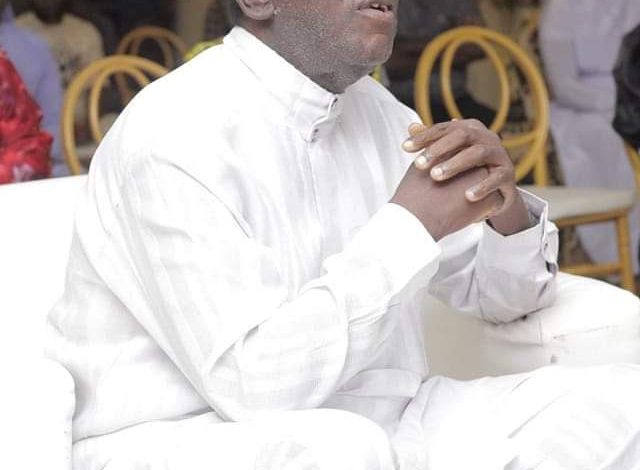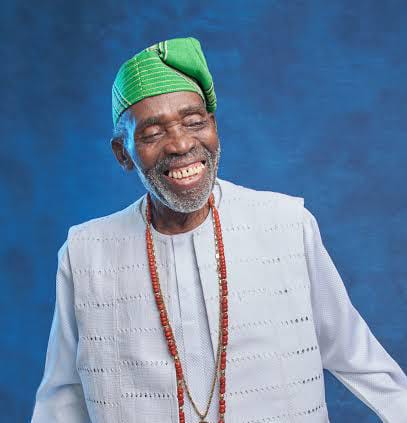Shock, grief as literary community mourns ‘Nigger at Eton’ author, Dillibe Onyeama

‘He was an all-out bibliophile’
‘An iconoclast of sort in Nigerian literature’
‘He became a legend roughly 45 years ago’
By Anote Ajeluorou
THERE was palpable shock and grief on November 11, 2022 when news broke of the passing of the author of Nigger at Eton and other novels, Dillibe Onyeama. He joined his ancestors after suffering heart attack. He was 71 years old. Onyeama’s love for books and writing was legendary, and he invested all he had in the pursuit of the propagation of literary endeavours over the years since returning to Nigeria in his early 30s after holding journalist and publishing executive positions in the UK where he studied journalism.
Only last August, in words that are now being also said for him, he’d mourned the passing of his younger friend, another literary artist, Biyi Bandele, thus: “Bon voyage, Biyi Bandele, as you relocate to a better place. You will still be sorely missed by many, and well remembered for all your great works – most notably in the art firmament. I commiserate dearly with the loved ones whom you have had to leave behind in a vacuum that will never be filled, while I personally thank you for your interest and moral support. Well lived, bon voyage, and RIP!”
His first novel Nigger at Eton (later renamed in a reprint as A Black Boy at Eton, to make the title politically correct) launched Onyeama into literary limelight, but it also attracted intense criticism to him at the time for ruffling British establishment that the elitist, racist school that Eton represented while he was its first black student in 1969. He was subsequently banned from ever visiting the school, a racist decision that was rescinded in 2020 in the wake of Black Lives Matter protestsa against the evil legacies of colonial past. However, an open invitation was subsequently extended to Onyeama by the school headmaster Simon Henderson to visit any time he wanted. However, Onyeama could not and would not be able to return to Eton.

Onyeama was registered at birth for Eton by his father who was a former Chief Justice of Supreme Court of Nigeria, who was later appointed as judge to the International Court of Justice at The Hague, Netherlands. Onyeama arrived Eton at age 14 and was stunned at the racial abuses his classmates hauled at him. He would excel in sports and later gained grudging approval from his mates and teachers. Other works Onyeama wrote include Sex is a Nigger’s Game, Juju, The Flaming Sword, among others.
On returning to Nigeria, Onyeama set out to replicate the successes he recorded in England and set up Delta Publications Ltd, and contributed in publishing the works of many Nigerians writers including Abubakar Gimba. Onyeama was not just satisfied with publishing himself and other writers, he also sought ways of broadening the literary space, and got involved in many projects designed to bring writers and readers together. He set up the Coal City Book Convention in Enugu, where he lived to his last days. Onyeama created the Orlando Equaino Award to honour distinguished members of society who have made contributions to knowledge and a better society at each convention of Coal City Book Convention. Many benefited from the award.
Onyeama was eager to stretch his hand of fellowship across the Niger, and would later set up another yearly book forum in Lagos called Lagos Book Fiesta with ‘Profiles at the Lagoon’ as sub-theme. He also created an award system around it which he aptly called The Tutuola Palm for Poetry award in recognition of the pioneering efforts of the writer, Amos Tutuola, author of The Palm-Wine Drinkard. Apart from establishing Delta Publications Ltd, the Coal City Book Convention and Lagos Book Fiesta, Onyeama also set up Delta Book Club, another avenue through which he promoted books, reading and writing. Indeed, Onyeama’s impact in the book ecosystem has been huge in 40 years since he returned from England to set up shop at home. This is in spite of the economic hardship and an unfriendly environment that characterise Nigeria’s business environment, especially the book trade.
One man who worked closely with the late Onyeama is the President of Network of Book Clubs and Reading Culture Promoters in Nigeria (NBRP), Mr. Richard Mammah, who paid glowing tribute to him for his undying love for books and numerous efforts to promote them to the reading public. Mammah fondly recalled their relationship thus, “I had met him through his books. And then in 2000, Synergy Educational advertised the Lagos 2000 Bookfair and he was at this time CEO, Delta Publications, Enugu. He came over for the fair and remained one of our most consistent patrons for the years the fair series lasted.
“When we told him that a review of our operating model had necessitated halting the annual event, he objected, insisting that we go on anyways. But we were sure about why we were going that route: we were making a sacrifice to engender greater collaboration in the broader book ecosystem. Some years later, we called on him and Ranti Olumoroti of Options Books to help organise the revived National Book Week’s zonal activities in Enugu and Ibadan. To their credit, they went after it with so much dedication and commitment.
“Subsequently, he hinted me of his plans to host an annual poetry awards event in Lagos, The Tutuola Palm for Poetry. I assisted in moderating two of the editions and later introduced Mr. Emmanuel Okoro to him to continue with that support role which he also continued to do until this very painful loss. He was an all-out bibliophile. A remarkable man. Will really be missed. Was looking forward to inviting him to join us for the NBRP Lagos Book Walk in April next year, and I am sure he would have very gladly participated. That is the greatness of the gem that has just departed these mortal shores.”
Professor of English at Abia State University, Uturu, Austine Amanze Akpuda (FANA), is effusive of praise for Onyeama for his contribution to writing and publishing in the country, and recalled the many times he encountered the man who remained humble in spite of his elitist family and his educational backgrounds.
“Dillibe Onyeama became my hero when as a secondary school child I read his Nigger at Eton and later Sex is a Nigger’s Game,” Prof. Akpuda said. “After reading two of the biographies he wrote, one on Jim Nwobodo and another on Arthur Nzeribe , I came to the conclusion that Onyeama knew how to create legends out of ordinary, clay-footed men. I was on telephone conversation with Onyeama some years ago when I needed to procure some of the books he published for some Nigerian authors and last year when I was searching for science fiction written by Nigerians. Beyond his own work on the subject, Onyeama also drew my attention to the fact that Professor Anezi Okoro also wrote one which though published by Onyeama was no longer in stock.
“On the occasions we spoke on the telephone or met at some book events, Onyeama did not let his unique family heritage to come between us. Despite the shrewdness with which he handled issues bordering on his publishing business, Delta Publications, he still displayed a measure of camaraderie that appeared unusual for someone who became a legend roughly 45 years ago. It is a great tribute to Dillibe’s memory that in his lifetime, the management of the elite school at Eton formally acknowledged that the novelist exposed aspects of the racist foundations of the school and for which they offered their apologies after many decades of living in denial. The late Onyeama will always be remembered as a very important Nigerian writer and publisher.”
Former President of Association of Nigerian Authors (ANA), Mallam Denja Abdullahi, wished the news was mere romour, as he like others, could not wrap their minds around it being real: “May it be a rumour. Dillibe is an iconoclast of sort in Nigerian literature. A notable writer of unusual pieces (Nigger at Eton, etc) and an ardent publisher and promoter of unsung literary talents. We saw each other last some years ago in Enugu where I discussed the possibility of putting into drama the unique story of his grandfather, Chief Onyeama of Eke.”
It was the same vain hope by Mr. Ayo Vaughan, when the news hit him, “My God! I sincerely hope this is not true. Dillibe is one of the great(est) icons of literature in Nigeria. I was opportune to meet him physically about two years ago when he came to run a literary assignment in Lagos which I attended. Very liberal and broad-minded Nigerian. I really, really hope this is not true, because it is not yet a widely circulating news. I hope it turns out to be an insensitive rumour.”
On his Facebook wall, writer and critic, Mr. Chiedu Ezeana mourned Onyeama thus, “Writer and publisher, and author of the famous memoir, Nigger at Eton, passed away yesterday after a heart attack… Rest, weaver of memorable words… Rest, imaginer of a more harmonious and tolerant world…”
Also paying tribute to the famous author of Nigger at Eton is journalist and writer, Anote Ajeluorou who felt numb all day upon receiving the shocking news from a mutual friend, Mr. Samuel Osaze. “Dillibe was such a great friend,” he recalled. “He took me like his pal in spite of our age difference. He would call me ‘AA’, and I would in turn call him ‘Oga DO!’ that was the measure of our friendship. All it took for him to warm up to you is your interest and love for books and journalism and writing. Somehow, I couldn’t attend any of the Coal City Book Conventions he organised, but he would later send me reports which I published in The Guardian. He saw the best in people, and constantly agonised about the country not getting it right, so the gospel of books and writing could be spread much wider than it was, and still is.
“When my children’s book Igho Goes to Farm came out in 2019, DO was so excited about it. He proposed immediately that I must read from it at the next Lagos Book Fiesta. That was exactly what happened. He commissioned me on many occasions to write a summary of the year’s artistic and cultural life with a leaning to literary art for his literary magazine, The Pen, and he’d insist on paying for the articles. He was such a beautiful soul, and a humble man, even if he still retained his early English upbringing having spent his early years among British people. That early acculturation still reflected in the felicity of his spoken and written English. He will be sorely missed.
“Journey well, great friend and Wordsmith! May your journey to ancestorhood be smooth!!”




0 Comment
A beautiful tribute to a great writer and book lover. May his soul rest in peace. And may God reward your efforts for sharing this fine piece.
Sad, left too early. Will never forget the impact his “Nigger at Eton” left on me as a young secondary school student in the early seventies. It opened me into the world of racism and white supremacy arrogance at a time many African countries were still under colonial bondage. May his soul rest in peace, Amen.
Amb. Peters Emuze